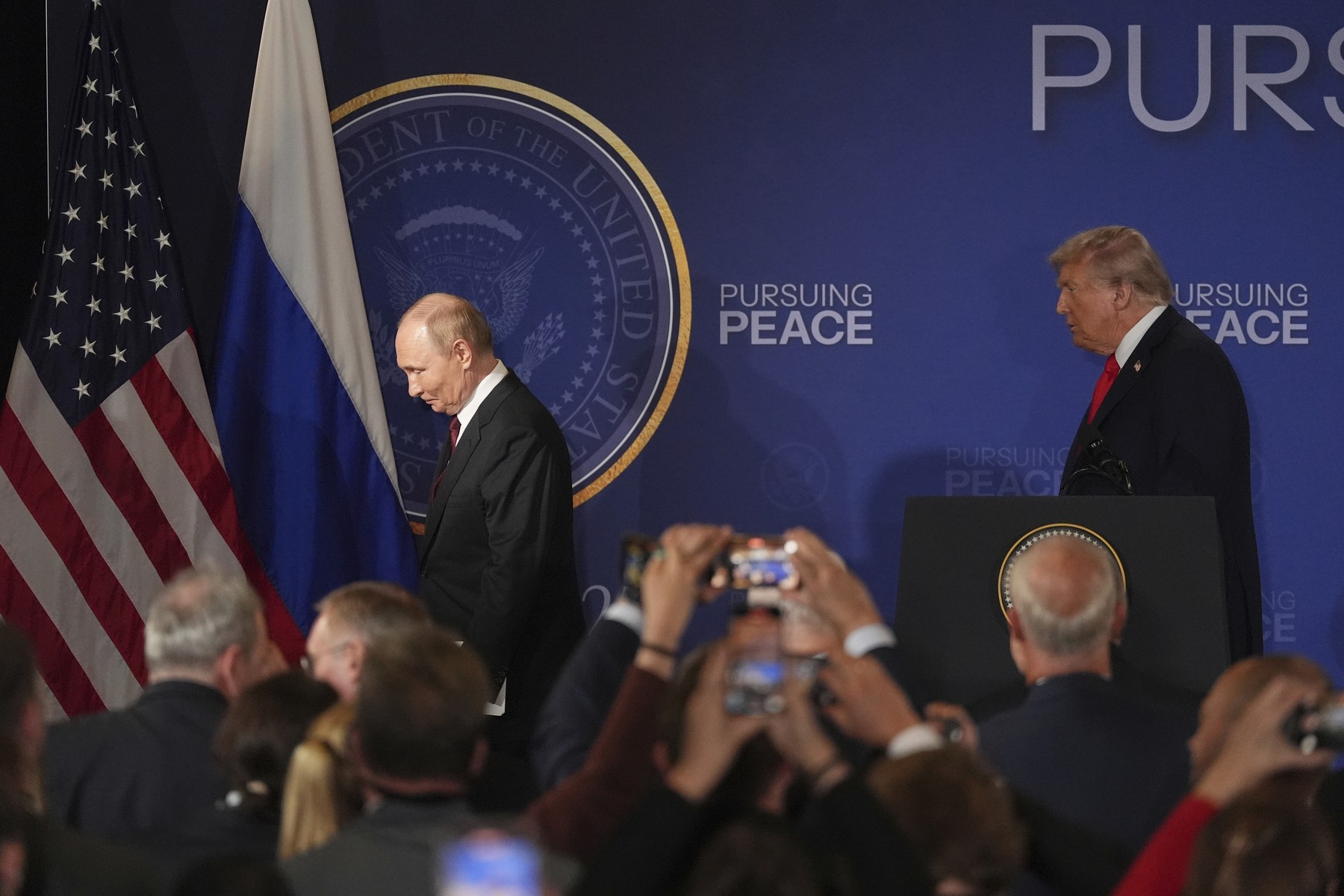
Lacking a definitive strategy of their own to conclude the war, European leaders now express concerns that President Donald Trump may push Kyiv into accepting terms excessively favorable to Russia, which could include the surrender of territories not currently under Moscow’s control, according to reports from the New York Times, Reuters, and Financial Times. While in Alaska, Putin insisted on receiving all of Donetsk, and Trump relayed this demand to Volodymyr Zelenskiy, who declined it.
European and Ukrainian perspectives suggest that the Alaska summit did not culminate in the worst-case outcome.
President Donald Trump has yet to sanction Ukraine’s transfer of territories to Russia or restrict European support for Kyiv.
Nonetheless, this does not imply that European leaders feel entirely reassured.
Subsequent remarks and dialogues indicated that Trump genuinely perceives a peace agreement as achievable in the near term, contingent upon Ukraine’s willingness to cede further territory in the Donbas area.
He thus places the onus on President Volodymyr Zelenskiy to consent to this, as noted by two European officials referenced by New York Times.
In comments following the summit, Trump lauded Vladimir Putin and remarked that Russia „is a very large power”—in contrast to Ukraine.
„It now truly hinges on President Zelenskiy to move this forward,” he stated. „I would also suggest that European nations should engage a bit more,” added the head of the White House.
It remained unclear whether he implied that Europeans should urge Ukraine to finalize an agreement or provide additional support and assurances to Kyiv.
Zelenskiy mentioned on Saturday that he spoke with Trump and would meet him in Washington on Monday, expressing skepticism that a serious peace treaty could be achieved as quickly as the American president seems to anticipate.
The Europeans’ Core Dilemma
The outcome of the Alaska summit underscores a core dilemma for Europeans. They do not have their own plan to conclude the war, much less to defeat Moscow, states the American publication.
This critique has not only emerged from across the Atlantic. Numerous analysts have pointed out the sluggishness in European actions and the absence of a concrete approach to end the conflict.
For Trump, the war in Ukraine is a hindrance to the relationship he seeks with Putin.
For Europe, however, the situation is distinctly different, and Ukraine’s fate bears strategic significance. If Ukraine fails, European leaders worry that other nations might follow and that Russia will attempt to test NATO in the upcoming years.
Analysts noted the symbolism when Russian Foreign Minister Sergei Lavrov arrived at his hotel in Alaska clad in a hoodie emblazoned with the USSR.
Putin has repeatedly expressed his nostalgia for the Soviet empire.
Europeans Require Trump
But what exactly is Europe’s strategy? In spite of the assistance rendered to Ukraine and the (gradual) mobilization of the defense sector, Europeans remain unwilling to fight Russia for Ukraine.
Speaking with the New York Times, Anatol Lieven of the Quincy Institute for Responsible Statecraft, a research organization based in Washington, remarked that „Europeans do not appear to possess a sound strategy.”
„Until this year, when Trump initiated this disordered peace process, they were demanding outcomes that will never materialize, such as a total withdrawal of Russia from all Ukrainian territories,” the expert added.
Now, under Trump’s influence, they accept that in the near term, Russia will retain 20% of the Ukrainian territory it has already seized, but they wish for Moscow to halt there.
European leaders released a joint statement on Saturday after their conversation with Trump, commending his efforts while refraining from endorsing his belief that peace negotiations are more desirable than a swift armistice.
„Europeans are aware of Trump’s unpredictability, his lack of empathy for Europe and Ukraine, and his peculiar fondness for Putin,” remarked Michael C. Kimmage, a history professor at the Catholic University of America and author of „Collisions,” which explores the origins of the Ukraine conflict.
Nevertheless, they require Trump, the professor asserted.
Putin’s Expectations
German Chancellor Friedrich Merz expressed a note of hope on Saturday, asserting that the United States is willing to engage in guaranteeing Ukraine’s security, as reported by Reuters.
„The positive development is that America is prepared to partake in such security assurances and is not relegating this task solely to the Europeans,” Merz stated to the German public broadcaster ZDF following discussions with Trump.
„If this comes to fruition, it will be more meaningful than an armistice,” he added.
Merz indicated that Trump implied Russia appears inclined to negotiate based on front-line conflict lines rather than the boundaries of the Ukrainian regions it claims.
„This represents a significant difference since Russia asserts ownership over territories it has yet to occupy,” he noted.
Nevertheless, other sources indicated that Putin has not relinquished his aim of claiming the entirety of Donbas.
Financial Times reported that the Kremlin leader allegedly demanded Ukraine withdraw from Donetsk, offering in exchange to stabilize front lines in Kherson and Zaporizhzhia.
Zelenskiy has consistently asserted that this demand is unfeasible, as it would entail relinquishing well-fortified positions, providing Russia a substantial advantage in any future offensive.
Trump communicated Putin’s request to Zelenskiy immediately post-summit, and the Ukrainian president turned it down.
Isolating Russia
Meanwhile, Europeans are striving to implement a modernized Cold War strategy: long-term isolation, encompassing Russia’s economic isolation.
In the short term, however, much hinges on the support provided to Ukraine, which is lacking in troops and experiencing dwindling morale, in order to establish a defensive line capable of halting Russia’s consistent advance.
This, together with the economic and political pressure that only the United States can exert, may persuade Putin that he has extracted all he can and that it is time to cease hostilities.
However, the endeavor is more challenging now, given Trump’s backing of Putin’s rhetoric and his lack of indications that he would pressure Putin, despite intermittent threats to do so.
For his part, as reiterated in Alaska, Putin continues to advocate for the resolution of „all the underlying causes of the conflict”—which, from his viewpoint, pertain to NATO’s encroachment into Russia’s sphere of influence following the Soviet Union’s collapse.
The Sole Tenable Path to Success for Ukraine
According to Alexander Gabuev, director of the Carnegie Russia Eurasia Center currently in Berlin, the only sustainable route to success for Ukraine lies in Russia beginning to deplete its soldiers.
„Ukraine can gradually negotiate territory to continue undermining Russia, but that will take another year or two,” he conveyed to the New York Times—as long as Washington continues to provide operational intelligence and Ukraine remains intact internally.
Even a prolonged armistice, similar to those in Korea or Cyprus, would be preferable for the remainder of Ukraine than a detrimental agreement, Gabuev stated.
„This would allow for a sovereign and independent Ukraine, aligned with the West, but not integrated into NATO or the European Union, free from a Russian veto,” he explained.
However, to achieve this, Gabuev emphasized, Europe must heighten economic pressure on Russia and persist in supplying Ukraine with substantial quantities of weapons. And, he asserted, it is crucial to keep Trump on their side.

